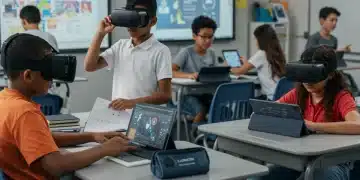College admissions AI trends: What to expect in 2023

AI trends in college admissions are revolutionizing the process by enabling personalized learning experiences, utilizing intelligent tutoring systems, and automating administrative tasks to enhance the overall efficiency and effectiveness of the admissions process.
College admissions AI trends are rapidly reshaping how students approach the application process. Have you ever wondered how technology impacts your chances of getting into college? This article dives into the nuances of these trends and their implications.
Emerging technologies in college admissions
The world of college admissions is evolving rapidly with the introduction of emerging technologies. These advancements are not just reshaping student applications but also enhancing the overall experience for both applicants and admission officers.
Artificial Intelligence in Admissions
One of the most significant trends is the incorporation of artificial intelligence (AI). AI helps colleges streamline their processes, making it easier to analyze applications and predict student success. With AI tools, admissions officers can evaluate data more efficiently, ensuring that they consider all necessary factors without bias.
Data Analytics
Furthermore, data analytics plays a crucial role in understanding trends. Colleges can now analyze historical data to determine which factors contribute most effectively to a student’s success. This shift allows institutions to attract candidates who are likely to thrive.
- Use predictive modeling to assess applicants.
- Identify successful student profiles based on past data.
- Improve the targeting of marketing efforts to prospective students.
As these technologies advance, it’s essential for students to understand how they influence their application process. Being aware of how emerging technologies affect admissions can empower students to present themselves better in their applications.
In addition, virtual tools for interviews and campus tours are increasingly popular. These allow students to engage with campuses from anywhere, making the admissions process more accessible.
Overall, staying informed about these technological trends can significantly enhance a student’s college application journey. The integration of innovative practices into admissions signals a shift towards a more efficient and fair evaluation system.
How AI is transforming application processes

AI is revolutionizing the way colleges process applications. By utilizing machine learning and advanced algorithms, colleges can efficiently sift through thousands of applications while maintaining a high level of accuracy.
Streamlining Application Reviews
The use of AI tools helps admissions officers quickly identify key strengths in applications. These tools can analyze essays and recommendation letters to highlight notable achievements or experiences that stand out. This efficiency not only saves time but also reduces the risk of human error.
Personalized Applicant Insights
Moreover, AI allows for more personalized insights regarding applicants. By analyzing patterns and trends from past admissions, institutions can identify what qualities contributed to student success within their programs. This information helps colleges make informed decisions, selecting candidates who align best with their values.
- Automated systems provide initial assessments of applicant suitability.
- Insights into applicant behavior can guide outreach efforts.
- AI can help craft tailored communications to prospective students.
Furthermore, AI technology enhances the overall applicant experience. Virtual assistants can answer questions in real-time, guiding prospective students through the process. This immediate support makes applying less daunting, encouraging more students to take the leap.
As applications become more tech-driven, students must adapt by ensuring their submissions are clear and compelling. Understanding how these systems work can dramatically improve their chances of success in a competitive field.
The role of data analytics in admissions
Data analytics is playing a crucial role in college admissions today. It helps institutions make informed decisions about prospective students by using data to identify patterns and trends.
Understanding Applicant Data
Colleges now collect a vast amount of data from applications. This includes academic records, extracurricular activities, and personal statements. By analyzing this information, admissions committees can assess which candidates are the best fit for their programs.
Predictive Analytics
Another significant aspect is predictive analytics. This approach uses historical data to forecast future outcomes. For example, colleges can determine what traits lead to student success based on past admissions. This data-driven strategy allows them to optimize their selection process.
- Identify successful student profiles for specific programs.
- Refine recruitment strategies based on applicant demographics.
- Enhance resource allocation for recruiting efforts.
As data analytics becomes more sophisticated, it also allows colleges to assess the effectiveness of different outreach strategies. They can evaluate which marketing campaigns bring in the most applicants or which high schools provide the most successful students.
Ultimately, leveraging data analytics improves the overall admissions process. By understanding trends and insights, colleges can create a more equitable system that benefits both students and institutions.
Future predictions for AI in higher education

The future of AI in higher education looks incredibly promising. As we move forward, technological advancements will play an even bigger role in shaping how students learn and how institutions operate.
Enhanced Learning Experiences
One major prediction is the rise of personalized learning experiences. AI will enable universities to tailor educational content to individual students. By analyzing a student’s performance and preferences, AI can suggest resources that suit their learning style.
Intelligent Tutoring Systems
Moreover, we can expect to see a surge in intelligent tutoring systems. These systems can provide real-time feedback and assistance, helping students grasp complex concepts more quickly. This support will be especially beneficial in subjects that students typically find challenging.
- Increased access to learning resources through AI.
- Real-time feedback for students to enhance their understanding.
- Adaptive learning strategies that evolve with each student.
Furthermore, AI is predicted to transform administrative tasks within educational institutions. Tasks like enrollment, scheduling, and even grading will become more automated. This efficiency allows faculty and staff to focus more on teaching and less on paperwork.
Collaboration between institutions and AI technology developers will likely grow as well. Colleges will partner with tech companies to develop new tools that meet the unique needs of their students and curriculum.
The future of AI in higher education holds enormous potential for transforming the way students learn and how institutions operate. With advancements in technology, we can expect personalized learning experiences that cater to each student’s needs. Intelligent tutoring systems will provide real-time feedback and assistance, improving academic outcomes. Additionally, automation will streamline administrative tasks, allowing educators to focus more on teaching. As colleges continue to integrate these technologies, the educational landscape will become more dynamic and accessible. Staying informed about these changes can empower students to navigate their educational journeys effectively.
FAQ – Frequently Asked Questions about AI in Higher Education
How will AI personalize learning experiences for students?
AI will analyze each student’s performance and preferences, providing tailored educational content that suits their unique learning styles.
What are intelligent tutoring systems?
Intelligent tutoring systems are AI-driven platforms that offer real-time feedback and assistance to help students understand complex subjects better.
How does AI improve administrative tasks in colleges?
AI automates routine tasks like enrollment and scheduling, allowing faculty and staff to concentrate more on teaching and less on paperwork.
What role will collaboration with tech companies play in education?
Collaboration with tech companies will lead to the development of innovative tools and resources that cater to the specific needs of students and educational institutions.





